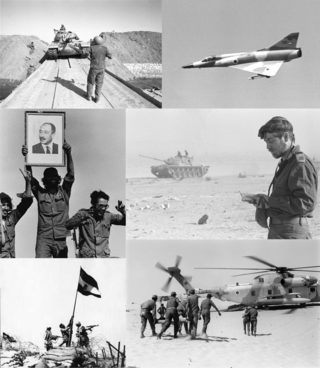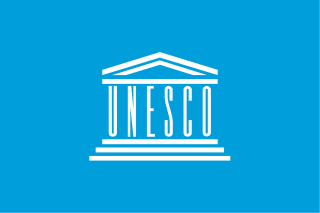
The Gaza Strip, or simply Gaza, is a polity and the smaller of the two Palestinian territories. On the eastern coast of the Mediterranean Sea, Gaza is bordered by Egypt on the southwest and Israel on the east and north.

The demographics of Israel, monitored by the Israel Central Bureau of Statistics, encompass various attributes that define the nation's populace. Since its establishment in 1948, Israel has witnessed significant changes in its demographics. Initially formed as a homeland for the Jewish people following the Holocaust in World War II, Israel has attracted Jewish immigrants from around the globe. Consequently, the Jewish population in Israel is incredibly diverse, with roots spanning Europe, Asia, Africa, and the Americas.

Jerusalem is an ancient city in West Asia, on a plateau in the Judaean Mountains between the Mediterranean and the Dead Sea. It is one of the oldest cities in the world, and is considered holy to the three major Abrahamic religions—Judaism, Christianity, and Islam. Both Israel and Palestine claim Jerusalem as their capital; Israel maintains its primary governmental institutions there, and the State of Palestine ultimately foresees it as its seat of power. Neither claim, however, is widely recognized internationally.

Palestinians or Palestinian people, also referred to as Palestinian Arabs, are an ethnonational group descending from peoples who have inhabited the region of Palestine over the millennia, and who are today culturally and linguistically Arab.

Tel Aviv-Yafo, usually referred to as just Tel Aviv, is the most populous city in the Gush Dan metropolitan area of Israel. Located on the Israeli Mediterranean coastline and with a population of 467,875, it is the economic and technological center of the country. If East Jerusalem is considered part of Israel, Tel Aviv is the country's second-most-populous city, after Jerusalem; if not, Tel Aviv is the most populous city, ahead of West Jerusalem.

The USS Liberty incident was an attack on a United States Navy technical research ship, USS Liberty, by Israeli Air Force jet fighter aircraft and Israeli Navy motor torpedo boats, on 8 June 1967, during the Six-Day War. The combined air and sea attack killed 34 crew members, wounded 171 crew members, and severely damaged the ship. At the time, the ship was in international waters north of the Sinai Peninsula, about 25.5 nmi northwest from the Egyptian city of Arish.

The West Bank, so called due to its relation to the Jordan River, is the larger of the two Palestinian territories. A landlocked territory near the coast of the Mediterranean Sea in the Levant region of West Asia, it is bordered by Jordan and the Dead Sea to the east and by Israel to the south, west, and north. The territory has been under Israeli occupation since 1967.

The Yom Kippur War, also known as the Ramadan War, the October War, the 1973 Arab–Israeli War, or the Fourth Arab–Israeli War, was an armed conflict fought from 6 to 25 October 1973, between Israel and a coalition of Arab states led by Egypt and Syria. The majority of combat between the two sides took place in the Sinai Peninsula and the Golan Heights—both of which had been occupied by Israel in 1967—with some fighting in African Egypt and northern Israel. Egypt's initial objective in the war was to seize a foothold on the eastern bank of the Suez Canal and subsequently leverage these gains to negotiate the return of the rest of the Israeli-occupied Sinai Peninsula.

The Israeli–Palestinian conflict is an ongoing military and political conflict in the Levant. Beginning in the mid-20th century, it is one of the world's longest-continuing conflicts. Key areas of the conflict include the Israeli occupation of the West Bank and Gaza Strip, the status of Jerusalem, Israeli settlements, borders, security and water rights, as well as Palestinian freedom of movement and the Palestinian right of return.

The Palestinian territories are the two regions of the former British Mandate for Palestine that have been occupied by Israel since the Six-Day War of 1967, namely the West Bank and the Gaza Strip. The International Court of Justice (ICJ) has referred to the West Bank, including East Jerusalem, as "the Occupied Palestinian Territory", and this term was used as the legal definition by the ICJ in its advisory opinion of July 2004. The term occupied Palestinian territory was used by the United Nations and other international organizations between October 1999 and December 2012 to refer to areas controlled by the Palestinian National Authority, but from 2012, when Palestine was admitted as one of its non-member observer states, the United Nations started using exclusively the name State of Palestine. The European Union (EU) also uses the term "occupied Palestinian territory". The government of Israel and its supporters use the label "disputed territories" instead.

Israelis are the citizens and nationals of the State of Israel. The country's populace is composed primarily of Jews and Arabs, who respectively account for 75 percent and 20 percent of the national figure; followed by other ethnic and religious minorities, who account for 5 percent.

Palestine, officially the State of Palestine, is a state in the Southern Levant region of West Asia. Founded on 15 November 1988 and officially governed by the Palestine Liberation Organization (PLO), it claims the West Bank and the Gaza Strip as its territory, all of which has been Israeli-occupied territories since the 1967 Six-Day War. The West Bank contains 165 Palestinian enclaves that are under partial Palestinian rule, but the remainder, including 200 Israeli settlements, is under full Israeli control. The Gaza Strip was governed by Egypt but conquered by Israel in 1967. Israel governed the region until it withdrew in 2005; although it is still considered to occupy Gaza. Hamas seized power after winning the 2006 Palestinian legislative election. The Gaza Strip has since been blockaded by Israel and Egypt.

The Israel national football team represents Israel in men's international football, and is governed by the Israel Football Association. They have been members of the European Confederation UEFA since 1994.
As of 2023, the world's core Jewish population was estimated at 15.7 million, 0.2% of the 8 billion worldwide population. Israel hosts the largest core Jewish population in the world with 7.2 million, followed by the United States with 6.3 million. Other countries with core Jewish populations above 100,000 include France (440,000), Canada (398,000), the United Kingdom (312,000), Argentina (171,000), Russia (132,000), Germany (125,000), and Australia (117,200). The number of Jews worldwide rises to 18 million with the addition of the "connected" Jewish population, including those who say they are partly Jewish or that have Jewish backgrounds from at least one Jewish parent, and rises again to 21 million with the addition of the "enlarged" Jewish population, including those who say they have Jewish backgrounds but no Jewish parents and all non-Jewish household members who live with Jews. Counting all those who are eligible for Israeli citizenship under Israel's Law of Return, in addition to Israeli Jews, raised the total to 25.5 million.

Israel's policies and actions in its ongoing occupation of the Palestinian territories have drawn accusations that it is committing the crime of apartheid. Leading Palestinian, Israeli and international human rights groups have said that the totality and severity of the human rights violations against the Palestinian population in the occupied territories, and by some in Israel proper, amount to the crime against humanity of apartheid. Israel and some of its Western allies have rejected the accusation, with the former often labeling the charge antisemitic.
The Gaza–Israel conflict is a localized part of the Israeli–Palestinian conflict beginning in 1948, when 200,000 Palestinians fled or were expelled from their homes, settling in the Gaza Strip as refugees. Since then, Israel has fought 15 wars against the Gaza Strip. The number of Gazans killed in the most recent 2023 war — 24,000 — is higher than the death toll of all other wars of the Arab-Israeli conflict.

The United Nations Educational, Scientific and Cultural Organization (UNESCO) is a specialized agency of the United Nations (UN) with the aim of promoting world peace and security through international cooperation in education, arts, sciences and culture. It has 194 member states and 12 associate members, as well as partners in the non-governmental, intergovernmental and private sector. Headquartered in Paris, France, UNESCO has 53 regional field offices and 199 national commissions.
Visitors to Israel must obtain a visa from one of the Israeli diplomatic missions unless they come from one of the visa exempt countries. All visitors must hold a passport that is valid for 6 months after the date of departure from Israel.

The Mandatory Palestine national football team, also known as the Eretz Israel national football team, represented the British Mandate of Palestine in international football competitions, and was managed by the Palestine Football Association.














